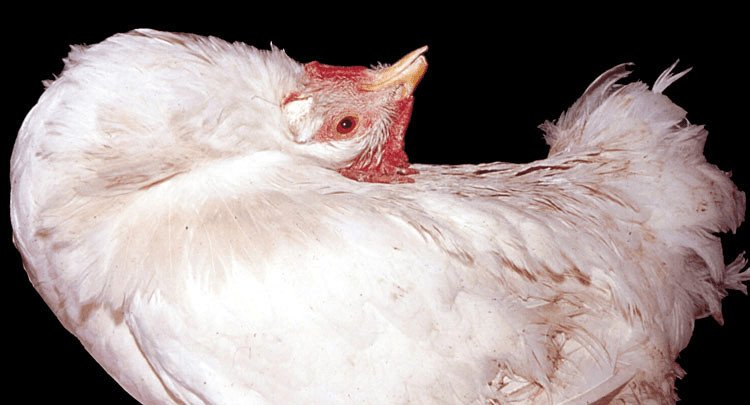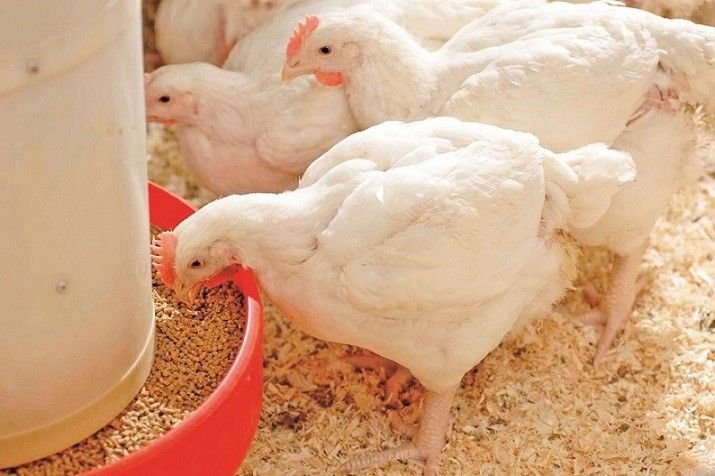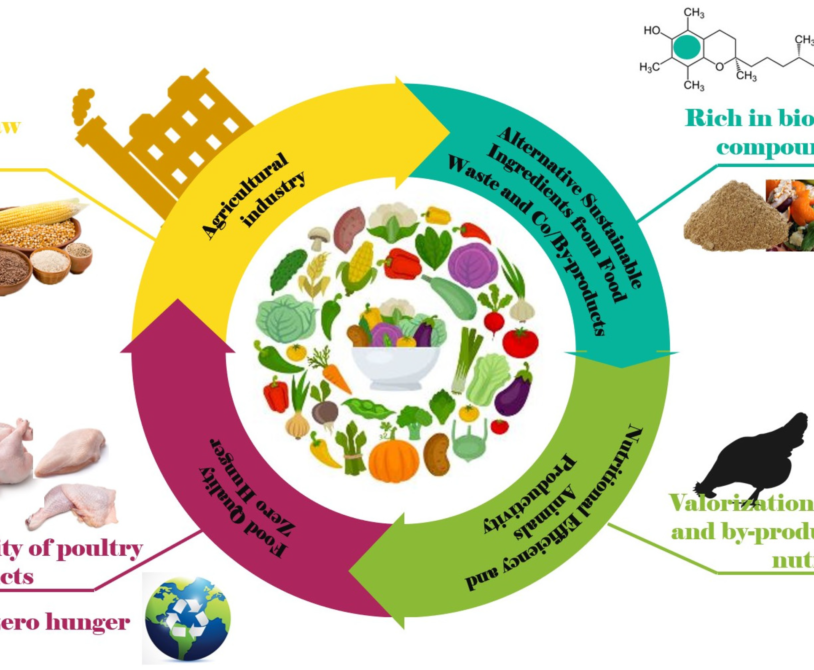Nutritional problems in broiler chickens can lead to slow growth and weak immune systems. They also make chickens more likely to get sick. It’s important to prevent and manage these issues to keep broiler flocks healthy and productive. This article will look at the common nutritional deficiencies in broilers, why they happen, how to spot them, and how to prevent and treat them.
Key Takeaways
- Up to 16% of broilers on a given farm can be affected by lameness due to nutrient deficiencies.
- Vitamin D3 is preferred over D2 for broilers due to its higher potency, especially during early growth.
- Supplementing broiler diets with 25-hydroxycholecalciferol can decrease leg disorders and enhance bone mineralization.
- Vitamin A, E, and B group deficiencies can lead to various leg abnormalities and lameness in broilers.
- Proper supplementation and a balanced diet can prevent nutritional deficiencies in broiler chickens.
Introduction to Nutritional Deficiencies in Broilers
Proper poultry nutrition is key to broiler health and performance. Broiler chickens need specific nutritional requirements for growth, immune function, and more. Without these, they face health issues like poor growth and disease.
Importance of Proper Nutrition for Broiler Health
Broiler chickens can suffer from common nutritional deficiencies like water, protein, and vitamin shortages. These can cause dehydration, poor growth, and more. Each deficiency has its own consequences for the birds.
Common Nutritional Deficiencies and Their Consequences
- Water deficiency can lead to dehydration and impaired growth.
- Protein and amino acid deficiencies can result in poor feathering, reduced muscle development, and weakened immune response.
- Insufficient fats and essential fatty acids can cause poor growth, skin and feather issues, and impaired reproductive function.
- Vitamin deficiencies can lead to various health problems, such as poor bone development, weakened immunity, and increased susceptibility to diseases.
- Mineral deficiencies, particularly in calcium and phosphorus, can affect bone formation and strength, leading to skeletal abnormalities and decreased productivity.
It’s vital to keep a balanced nutritional program for the best broiler health and performance.
Water Deficiency and Its Impact
Keeping broiler chickens hydrated is key to their health. Water deficiency can cause serious problems. It can lead to less eating, slower growth, and even death.
Broiler chickens need a lot of water, more than they eat. Not having enough water can harm them a lot. Consequences of water deficiency in broilers include:
- Eat and drink less
- Slower growth and less weight gain
- Uric acid buildup, causing gout and health problems
- Being more likely to get sick
- Higher death rates
It’s vital to keep water clean and fresh for broiler chickens. Watching how much water they drink and making sure it’s good quality helps. This prevents the bad effects of water deficiency in broilers.
| Nutrient | Deficiency Symptoms | Impact on Broiler Performance |
|---|---|---|
| Water |
|
|
“Proper hydration is a critical component of broiler nutrition, as water plays a vital role in various physiological processes essential for their growth and development.”
Fixing water deficiency in broilers and making sure they drink enough water helps. This makes their health and performance better. It also means more profit for producers.
Protein and Amino Acid Deficiencies
Proteins and amino acids are key for broiler chickens’ growth. Protein deficiency in broilers and amino acid deficiencies in broilers can cause problems. These include feather pecking, cannibalism, and perosis (slipped tendon). Broilers need 22.5% crude protein in their diet to avoid these issues.
Role of Protein in Broiler Growth and Development
Broiler chickens need essential amino acids like lysine, methionine, and choline. These amino acids are vital for growth, feather development, and metabolism. Deficiencies in these amino acids can cause various problems. This shows why it’s important to balance their diet with the right protein sources.
Essential Amino Acids and Their Functions
Broiler chickens need 22 amino acids for health. The functions of amino acids in broilers include supporting growth, feather development, and metabolism. Symptoms of amino acid deficiency in broilers include poor growth, reduced egg size, and feather-pecking.
Feeding them a diet with 17% protein, plus essential amino acids, is key. Supplements like Dried Mealworms and Dried Black Soldier Fly Larvae can also help. They address amino acid deficiencies in broiler flocks.
| Essential Amino Acid | Functions in Broilers |
|---|---|
| Lysine | Promotes growth, feather development, and immune function |
| Methionine | Supports feather growth, immune function, and feather pigmentation |
| Choline | Assists in fat metabolism, nerve function, and egg production |
Fats and Essential Fatty Acids
Fats and oils are key in broiler diets. They offer a lot of energy and important fatty acids. Without enough fats or essential fatty acids, broilers may eat less, grow poorly, and have bad feathers. They also might lay fewer eggs and have lower hatch rates. Broiler diets need at least 3% supplementary oils to get enough essential fatty acids.
Importance of Fats and Oils in Broiler Diets
Fats pack more energy than carbs, with 9 calories per gram compared to carbs’ 4. This makes fats a great energy source for broilers, helping them grow fast. Fats also help the body absorb vitamins A, D, E, and K, which are vital for health.
Broilers need linoleic acid, an omega-6 fatty acid, because they can’t make it themselves. It keeps their skin and feathers healthy and boosts their immune system. It’s important to make sure broiler diets have enough linoleic acid and other essential fatty acids for their health and performance.
“Fats and oils are critical components of broiler diets, providing a concentrated source of energy and essential fatty acids that are vital for overall health and productivity.”
Antioxidants like ethoxyquin are added to broiler diets with fats to keep feed fresh, especially in warm weather. This keeps the feed tasty and nutritious for broilers.
Vitamin Deficiencies
Vitamin deficiencies can harm broiler chickens’ health and productivity. These nutrients are key to many body functions. Without them, chickens may show symptoms and face complications.
Symptoms and Consequences of Vitamin A Deficiency
Vitamin A deficiency in broilers causes weakness, imbalance, and slow growth. They may also have ruffled feathers and get sick easily. Signs include swollen glands, mouth ulcers, and respiratory tract issues.
It’s important to add vitamin A and other fat-soluble vitamins to their diet. This helps keep them healthy and productive.
Role of Vitamin D in Bone Development
Vitamin D is vital for strong bones in broiler chickens. Without enough, they might get rickets. This means their bones are soft and weak.
To prevent this, it’s key to ensure they get enough vitamin D. This can be through sunlight or supplements. It helps their bones grow and stay strong.
Antioxidant Properties of Vitamin E
Vitamin E protects vitamins A and D, and fatty acids. Without enough vitamin E, chickens can get exudative diathesis. This is a serious condition with swelling and bleeding under the skin.
Vitamin E also works with selenium for broilers’ health. Adding the right amount of vitamin E to their food is important. It helps keep them healthy and productive.
| Vitamin Deficiency | Symptoms and Consequences |
|---|---|
| Vitamin A Deficiency | Weakness, imbalance, retarded growth, ruffled feathers, increased susceptibility to infections, swollen glands, ulcers in the mouth, and cheesy exudates in the respiratory tract. |
| Vitamin D Deficiency | Rickets, reduced bone mineral deposition, soft and brittle bones, and other skeletal abnormalities. |
| Vitamin E Deficiency | Exudative diathesis, characterized by massive edema and subcutaneous hemorrhages. |
“Ensuring adequate levels of vitamins A, D, and E in broiler diets is crucial for maintaining overall health, productivity, and preventing debilitating deficiency-related conditions.”
Common Nutritional Deficiencies in Broiler Chickens and How to Avoid Them
Broiler chickens, raised for their meat, can face nutritional issues if their diet is not right. It’s key to know these common problems and how to stop them. This helps keep broiler flocks healthy and productive.
One big reason for these issues is selective feeding. Chickens might pick and choose what they eat, leading to an unbalanced diet. Also, parasites can make it hard for chickens to absorb nutrients, making things worse.
Symptoms of these problems include poor egg laying, weight loss, and feeling tired. Leg weakness and lower immunity are also signs. Lack of Vitamin B can hurt the nervous system. Vitamins A, D, E, and K are vital for chicken health and growth.
To avoid these issues, producers can take a few steps:
- Give chickens a complete, balanced feed to ensure they get all they need.
- Add broad-spectrum vitamins and minerals to tackle many problems at once.
- Keep parasites under control to help chickens absorb nutrients better.
- Watch the flock’s health closely and fix any nutritional problems fast.
By knowing the common nutritional deficiencies in broilers, producers can manage their nutrition better. This helps prevent nutritional deficiencies in broilers and keeps their flocks healthy and strong.
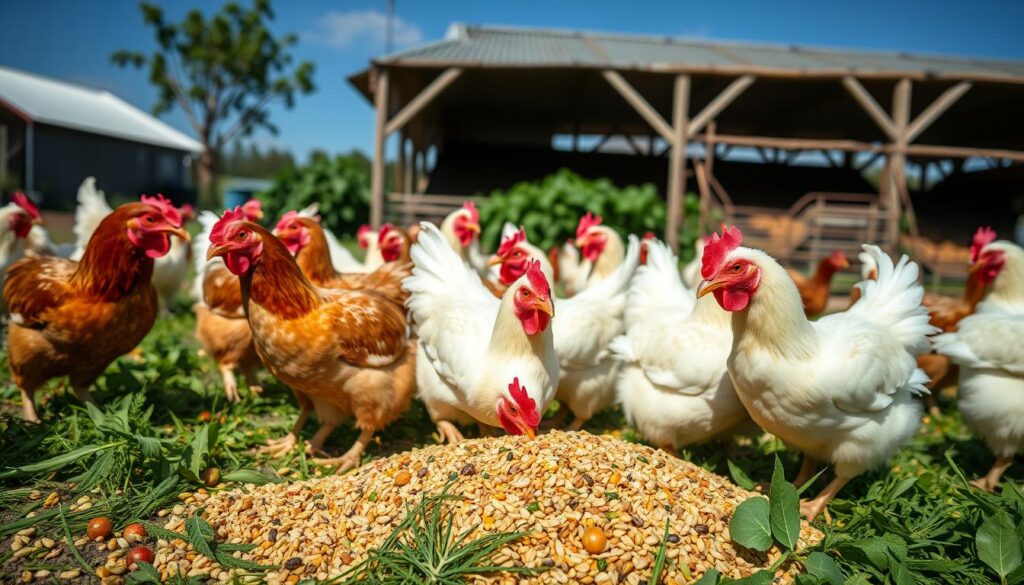
Mineral Deficiencies in Broilers
Keeping the right balance of minerals in broiler chicken diets is key ftotheir health and performance. Two big issues are calcium and phosphorus imbalances and manganese deficiency.
Calcium and Phosphorus Imbalances
Not enough or the wrong mix of calcium and phosphorus can cause serious bone problems in broiler chickens. These include rickets, osteomalacia, and other bone issues. These problems can hurt bone growth, egg laying, and how well eggs hatch.
It’s important to keep the right ratio of calcium to phosphorus and have enough vitamin D. This helps keep bones strong and supports the chickens’ overall health and performance.
Manganese Deficiency and Perosis
Broiler chickens need more manganese than other birds. Without enough, they can get perosis, or “slipped tendon.” This makes their bones twist and shorten, and can cause arthritis in their joints.
This makes it hard for them to move and eat, which affects their growth and how well they do. Adding enough manganese to their food can stop this serious problem.
| Mineral Deficiency | Consequences |
|---|---|
| Calcium and Phosphorus Imbalance | Rickets, osteomalacia, skeletal abnormalities, reduced egg production, and hatchability |
| Manganese Deficiency | Perosis (slipped tendon), arthritis, reduced mobility, and growth |
Fixing mineral problems in broiler chickens is vital for their health, productivity, and happiness. Making sure their food has the right minerals and amounts helps avoid these big problems. It also helps them grow and develop well.
Balancing Nutrient Ratios and Interactions
The balance of nutrients in broiler diets is key to their health and performance. Too much or too little of certain nutrients can cause problems. It’s important to get the right mix to avoid health issues and keep the birds well.
Amino acids, minerals, and vitamins are vital in poultry feed. They help with digestion and growth. Adding certain amino acids and minerals can make the feed more effective and improve growth.
Nutraceuticals are also important in poultry science. They help keep birds healthy and prevent diseases. This is especially true since antibiotics are no longer used as much due to concerns about resistance and residues.
Getting the proper nutrient ratios in broiler diets is essential. It helps understand nutrient interactions in broilers and the importance of balanced broiler nutrition. By balancing nutrients well, poultry producers can keep their birds healthy and productive, leading to successful operations.
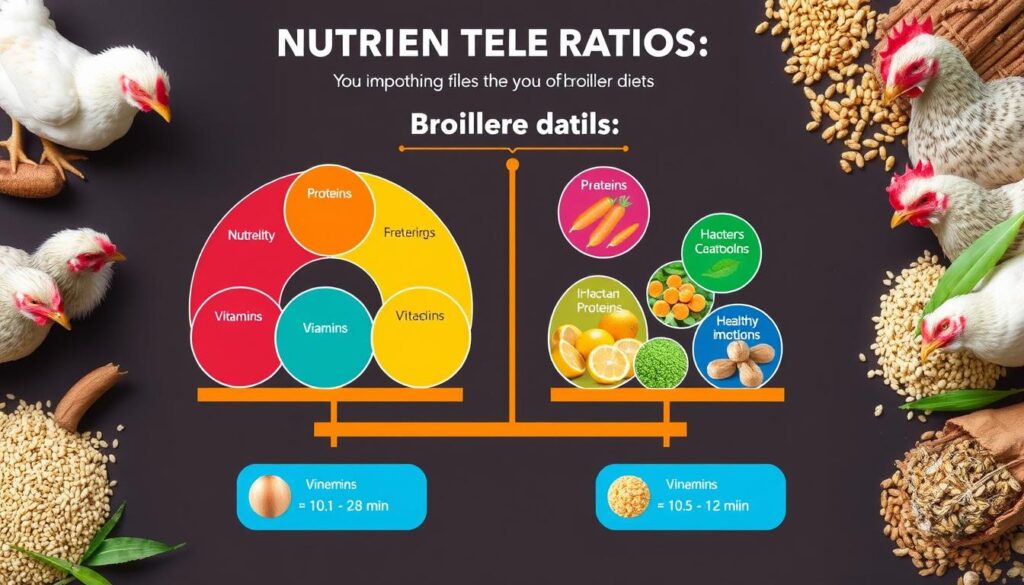
“Nutraceuticals have gained importance in poultry science, contributing to improved production performance by establishing normal physiological health status and preventing diseases.”
Feeding Strategies for Preventing Nutritional Deficiencies
Creating a balanced broiler diet is crucial. It must meet the birds’ specific nutritional needs. This means picking and mixing feed ingredients correctly. It’s important to have the right amounts of proteins, amino acids, fats, vitamins, and minerals.
It’s also key to keep an eye on the diet and make changes as needed. This ensures the birds get what they need as they grow.
Formulating Balanced Broiler Diets
Making a balanced broiler diet needs a good understanding of what broilers need. Poultry experts study the dietary needs of broiler chickens. They look at the right mix of nutrients to support growth and health.
Incorporating Feed Supplements and Premixes
Using broiler feed supplements and premixes is also important. These products add extra nutrients to the diet. They help fill any gaps in the main feed. Adding the right supplements and premixes is key to avoiding nutritional problems in broilers.
“Balanced nutrition is the foundation for healthy, productive broiler chickens. By carefully formulating diets and incorporating targeted supplements, poultry producers can ensure their flocks receive all the essential nutrients they need to thrive.”
Monitoring and Managing Broiler Nutrition
Keeping broiler nutrition right is key to their health and success. It’s important to watch them closely and fix any nutritional deficiencies quickly.
Checking how the birds grow, eat, and stay healthy tells us a lot. Also, testing their food helps make sure it’s good for them.
By watching the broilers and changing their food as needed, farmers can keep them healthy. This way, the birds grow well and stay happy.
Key Aspects of Broiler Nutrition Management
- Regular evaluation of broiler growth, feed efficiency, and overall health
- Conducting feed analyses to ensure the diet meets the flock’s nutritional needs
- Identifying and addressing any nutritional deficiencies ipromptly manner
- Adjusting feed formulations or supplementation to optimize broiler nutrition
| Common Nutritional Deficiencies in Broilers | Symptoms | Consequences |
|---|---|---|
| Protein and Amino Acid Deficiency | Slow growth, weight loss, decreased egg laying, and feather picking | Impaired muscle growth, immune function, and overall health |
| Vitamin and Mineral Deficiencies | Bone deformities, poor eyesight, impaired fertility, delayed blood clotting | Decreased growth, reproduction, and overall well-being |
| Fatty Acid Imbalances | Fatty liver syndrome, poor organ cushioning | Health issues and decreased energy storage |
By monitoring broiler nutritional status and addressing any nutritional deficiencies quickly, farmers can keep their flocks healthy and productive.
It’s key to prevent nutritional deficiencies in broiler chickens for their health and growth. Knowing the common deficiencies and their causes helps producers create better diets. They can use balanced diets, supplements, and premixes to meet their flock’s needs.
By focusing on broiler nutrition, producers can improve their flock’s health and productivity. This is vital for the success and growth of their operations. Proper nutrition is crucial for preventing nutritional deficiencies in broilers and ensuring their health and growth.
Producers who focus on the nutritional needs of broiler chickens can greatly benefit their operations. They can see better productivity, lower mortality rates, and a more profitable future for the industry.


